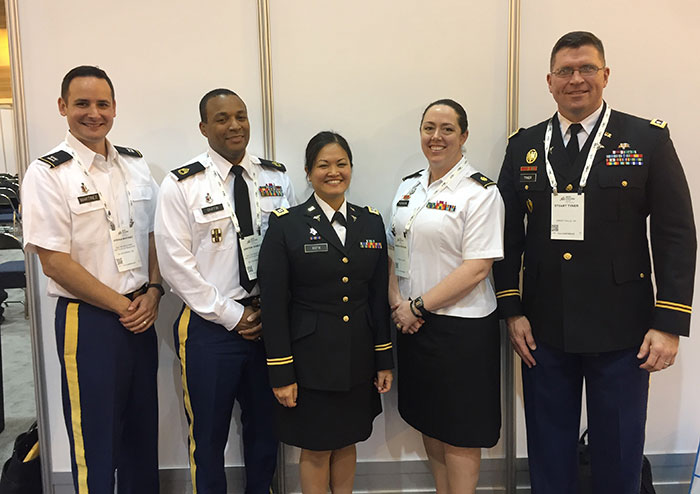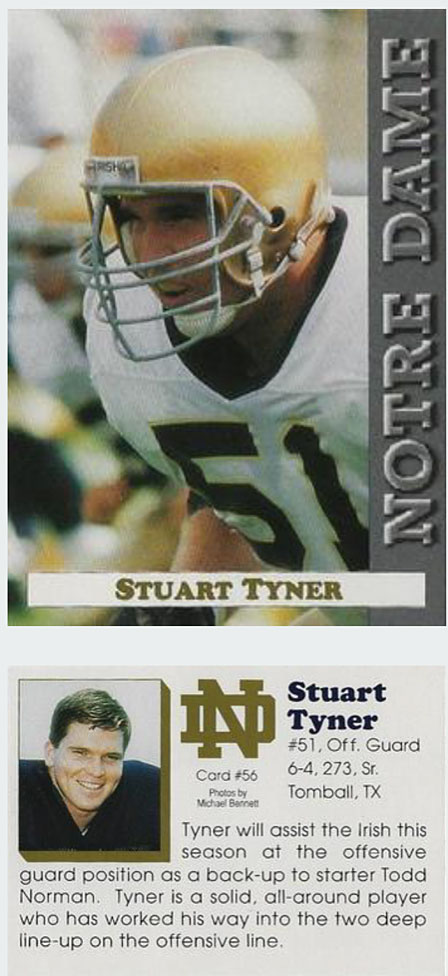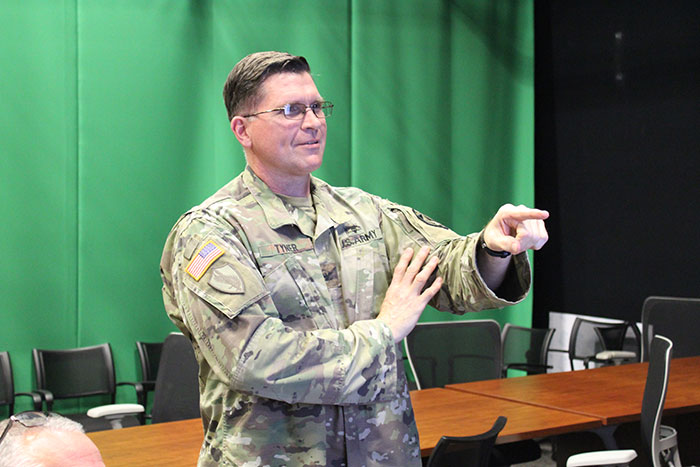Breaking the Huddle: Tyner Steps Off the Field, Into Retirement

Col. Stuart Tyner is in his element. On a cool October morning, standing inside the Fort Detrick Auditorium amongst a large group of peers and coworkers, he smiles and shakes hands and does all the things you're supposed to do at a retirement ceremony. As the former director at the U.S. Army Medical Research and Development Command's Military Infectious Diseases Research Program – a position he exited early this past summer – many of the people in attendance are just now catching up with Tyner before quickly saying their final goodbyes. Watch him for long enough and you get the feeling this is the kind of setting he'll miss the most when he hangs up his uniform for good.
"One of the essential themes of my military career – maybe my life, really – is people," says Tyner, who will officially retire from the Army in January of next year after a 22-year career. "Whether it's writ large in the Army or even more broadly, I don't think it's possible to be a good officer unless you love Soldiers and you love being a Soldier."
As much affection as he has for the Army, Tyner found his first love (of sorts) some 35 years ago on the wide-open athletic fields of Tomball, Texas, a relatively small town about 45 minutes northwest of Houston. It was there where the six-foot-four Tyner blossomed into a football standout – one who eventually matriculated to the University of Notre Dame in South Bend, Indiana, to play football for hall of fame coach Lou Holtz. That journey, via a collegiate career that ran from 1989 to 1994, is one that Tyner still looks back upon fondly.

"That was one of the best experiences of my life," says Tyner, who also threw the discus on the university track team. In the end, it was the academics that beat out the athletics, paving the way for Tyner – a rare prospect who played both offense and defense during his football career – to join the military. "I always joke that if I was any good at football," he says in his typical, jovial manner, "I wouldn't have had to join the Army."
In short order, however, he found that a military career offered a similar kind of intensity – and by association the kind of busy, nonstop and sprawling experience few scientists get to encounter. To wit, in the early 2000s Tyner found himself in Thailand working on the development of malaria-resistant therapies before moving to Cambodia to perform clinical studies in the same general vein. From there, he was stationed at MRDC's Institute of Surgical Research – an experience which he calls a "gratifying and eye-opening job" – ultimately serving as director of research during his last year in San Antonio. Following those stops, he was stationed at MRDC's Walter Reed Army Institute of Research, where he worked on projects related to wound infection – focusing specifically on the threat of infection in a near-peer conflict. After holding a posting of some sort within MRDC for more than 14 years, Tyner took over as director of MIDRP in 2020.
"I've been fortunate enough to have four-or-five jobs within MRDC that have been truly fantastic," says Tyner. "They say it's always good to work on the problem and work on the research where it's important and also when it's important. And just out serendipity I've had the good fortune to be able to do that."
Outside of the lab, Tyner also seems to have made his mark as a teacher and a mentor to both younger Soldiers and his fellow officers alike. Start calling some of the previous places he's worked over the past 22 years and you'll find no shortage of folks willing to say thanks and offer praise.
"He's been an excellent mentor over the years, and he's made lasting changes to Army Medicine," says Maj. Amanda Roth, a microbiologist who worked underneath Tyner at WRAIR from 2015 to 2017 and then alongside him as a member of various steering committees over the past four years. She points to the substantial changes Tyner made at MIDRP to boost outside business investment as one of his strongest accomplishments. "I'm excited to get a chance to talk about him, honestly," says Roth. "I'm sorry to see him go, but I'll be happy to see him assume the civilian career he so richly deserves."
"He's a model Army officer and microbiologist," says Col. Robert Cybulski, who serves as both the director of the Bacterial Diseases Branch at WRAIR and as an assistant professor at the Uniformed Services University. The owner of a more than two-decade long service career himself, Cybulski has known Tyner for more than 12 years and considers him a close friend. "He has all the skills you want to teach junior officers both in the Army and in the lab – and in addition, when it came time to deploy, he raised his hand for that task as well," says Cybulski, noting Tyner's 2013 deployment to Afghanistan as part of a joint combat casualty care research team supporting the Marines. He is someone who has certainly left his mark on Army Medicine."

Leaving a lasting impression is a benefit, sure, but for Tyner – a father of three whose wife is a retired Army Colonel herself – leaving such important work in good, capable hands is the true accomplishment. After all, it wasn't that long ago when his own capacities were tested by the recent COVID-19 pandemic (an experience Tyner recalls began as "absolute chaos" before settling into a measured – but still near round-the-clock – response effort). And beyond that, it was only a few months ago when he ceded the directorship of MIDRP to Col. Christian Hofer, a good friend who boasts a 35-year military service career of his own. In Tyner's mind, these achievements – quick action, a robust team response in times of need and smooth personnel transitions – are the true ways to measure success.
Perhaps that's why autumn days like this one – crisp weather, early sunsets, football season upon us – serve as the perfect bookend for Tyner's career. A professional life that, in many ways, started on a hot, humid Texas gridiron before leading him halfway around the world now winds down in front of a cool, calm October backdrop. Past the goalposts and past the lab equipment, walking past the countless budget meetings and into the parking lot, away from the fans and the coaches and the military pals and contractors – Col. Stuart Tyner is gone, he's left the stadium for good.
"I'm going to miss being around my fellow Service Members," he says, "but more broadly than that, I've had the good fortune of engaging across my career with hard-working civilians and contractors – people who are committed to the mission and passionate about what they do. I'm going to miss all of those people, all of their energy – all of it."
 An official website of the United States government
An official website of the United States government
 ) or https:// means you've safely connected to the .mil website. Share sensitive information only on official, secure websites.
) or https:// means you've safely connected to the .mil website. Share sensitive information only on official, secure websites.


